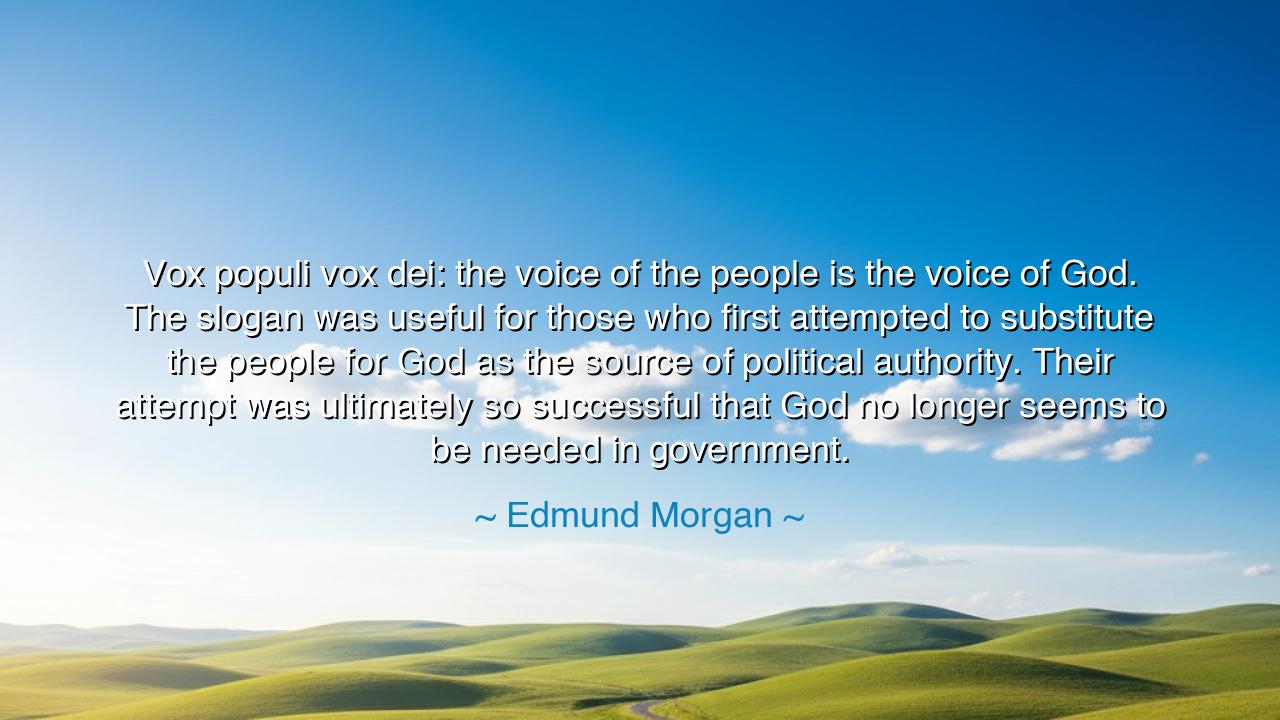
Vox populi vox dei: the voice of the people is the voice of God.
Vox populi vox dei: the voice of the people is the voice of God. The slogan was useful for those who first attempted to substitute the people for God as the source of political authority. Their attempt was ultimately so successful that God no longer seems to be needed in government.






"Vox populi, vox dei: the voice of the people is the voice of God. The slogan was useful for those who first attempted to substitute the people for God as the source of political authority. Their attempt was ultimately so successful that God no longer seems to be needed in government." — Edmund Morgan
Hear this saying, O seekers of wisdom, and consider the weight of its meaning. Edmund Morgan, a historian of profound insight, spoke these words not as an accusation but as a reflection on the long and wondrous journey of human governance — a journey from the rule of the divine to the rule of man. When he wrote of "vox populi, vox dei" — “the voice of the people is the voice of God” — he recalled an ancient proverb that once sought to sanctify the will of the many. Yet Morgan saw in it a paradox, a transformation so great that it remade the very foundation of authority: the shift from divine kingship to popular sovereignty, from God’s law to man’s will.
In the ages of old, rulers claimed their power by divine right. Kings and emperors declared that they ruled by heaven’s command, and to resist them was to resist the Almighty Himself. But as the centuries turned, as men began to awaken to reason and conscience, a new thought emerged — that perhaps it was not God who appointed rulers, but the people themselves. Thus the ancient saying “vox populi, vox dei” was reborn, not as a prayer, but as a declaration of human power. The people, it said, are the true sovereigns; their collective voice carries the weight of divine will.
It was during the Age of Enlightenment that this idea blazed forth in full glory. Think of the American Revolution, when the cry of “We the People” shattered the chains of monarchy. No longer would men bow to kings who claimed heavenly authority; instead, they would build governments founded upon consent, equality, and reason. Likewise, in France, the storming of the Bastille was not merely an act of rebellion — it was the uprising of a people who believed that their voice, not a crown, was the sacred voice of destiny. Morgan’s words remind us that this shift was not small — it was the turning of the world itself.
Yet he also warns us, in tones both subtle and sorrowful, of what followed. The slogan that once served to liberate mankind from tyranny became, over time, a justification to forget the divine altogether. The people, having dethroned kings, began to enthrone themselves. The sacred became secular; the eternal replaced by the expedient. Where once men sought to govern in harmony with the will of heaven, they now built systems of law that needed no higher reference, no guiding star beyond their own desires. Thus Morgan observes that the attempt to replace God with the people was “so successful that God no longer seems to be needed in government.” A triumph, perhaps — but also a loss.
For the ancients understood what many have since forgotten: that power, even when granted by the people, still demands humility before truth. When man becomes his own god, pride takes root; and when pride rules, corruption follows. The lesson of history whispers this again and again. Consider the fate of the French Revolution, which began in noble ideals — liberty, equality, fraternity — but descended into chaos and bloodshed when reason divorced itself from reverence. The voice of the people, unanchored by conscience, can roar like a storm and devour all it builds. Thus, Morgan’s reflection is not a condemnation of democracy, but a call for balance — for the people’s voice to be guided by the timeless moral law that transcends all governments.
The truth, then, is neither that God alone should rule, nor that the people alone should command, but that justice requires both spirit and reason — the conscience of heaven and the consent of man. A government without divine humility becomes arrogant; a people without moral compass become lost. The phrase “vox populi, vox dei” is noble only when the people remember that their voice must echo not just their will, but also their wisdom, their compassion, and their reverence for truth greater than themselves.
So let this be the lesson for every generation: celebrate freedom, but temper it with conscience. Listen to the voice of the people, but ensure it speaks with the heart of justice, not the noise of passion. Let every citizen remember that liberty is not license, and power is not holiness. The greatness of a nation does not lie in the loudness of its voice, but in the purity of its purpose. For when the voice of the people is guided by truth and humility, then indeed — and only then — it may still be called the voice of God.






AAdministratorAdministrator
Welcome, honored guests. Please leave a comment, we will respond soon